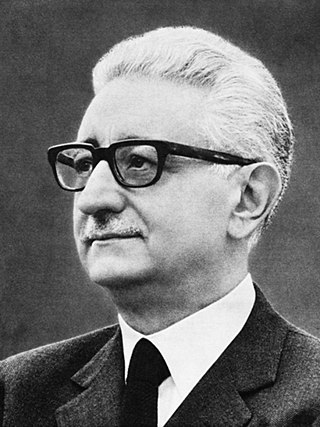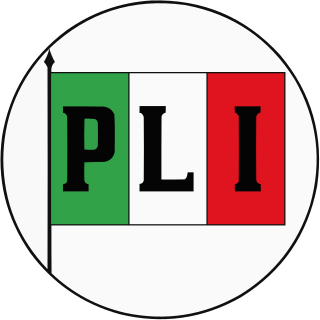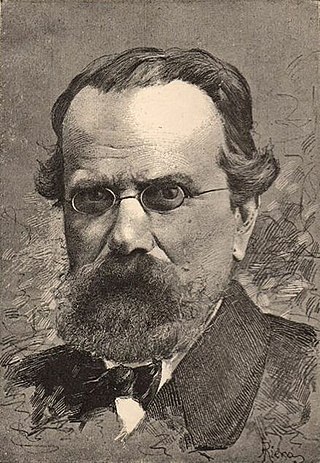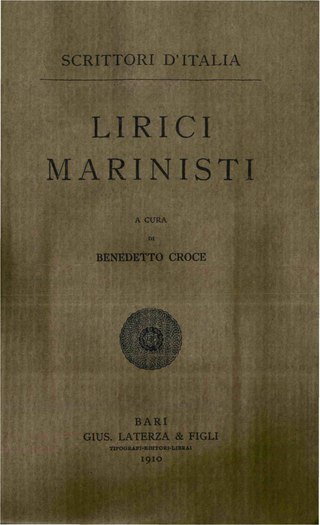
Benedetto Croce was an Italian idealist philosopher, historian, and politician, who wrote on numerous topics, including philosophy, history, historiography and aesthetics. In most regards, Croce was a liberal, although he opposed laissez-faire, free trade, and had considerable influence on other Italian intellectuals, including both Marxist Antonio Gramsci and Italian Fascist Giovanni Gentile.

Giovanni Leone was an Italian politician, jurist, and university professor. A founding member of the Christian Democracy (DC), Leone served as the President of Italy from December 1971 until June 1978. He also briefly served as Prime Minister of Italy from June to December 1963 and again from June to December 1968. He was also the president of the Chamber of Deputies from May 1955 until June 1963.

The Italian Liberal Party was a liberal and conservative political party in Italy.

Vincenzo Cuoco was an Italian writer. He is mainly remembered for his Saggio Storico sulla Rivoluzione Napoletana del 1799. He is a considered one of the precursors of Italian liberalism and the realist school. Cuoco adapted the critique of political rationalism of Edmund Burke and Joseph de Maistre for liberal ends, and has been described as a better historian than either of them. He influenced many subsequent Italian intellectuals, from Ugo Foscolo and Alessandro Manzoni to Bertrando and Silvio Spaventa to Benedetto Croce and Antonio Gramsci.

Giuseppe Nicolini was an Italian composer who wrote at least 45 operas. From 1819 onwards, he devoted himself primarily to religious music. He was born and died at Piacenza.

The Roman Catholic Archdiocese of Trani-Barletta-Bisceglie is a Latin rite archbishopric in the administrative province of Barletta-Andria-Trani, in the southeastern Italian region of Apulia. In 1980 it became a suffragan diocese in the ecclesiastical province of the Archdiocese of Bari-Bitonto, when it was demoted to non-Metropolitan status. It received its current name in 1986, when the Archbishopric of Trani added to its title the names of two suppressed bishoprics merged into it.

Francesco Paolo Bonifacio was an Italian politician, jurist and academic. He served as Minister of Justice and President of the Constitutional Court of Italy.
Giovanni Battista Valentini, (Cantalicio), was an Italian humanist, author and Catholic bishop.

Bertrando Spaventa was a leading Italian philosopher of the 19th century whose ideas had an important influence on the changes that took place during the unification of Italy and on philosophical thought in the 20th century.

Silvio Spaventa was an Italian journalist, politician and statesman who played a leading role in the unification of Italy, and subsequently held important positions within the newly formed Italian state.

Giovanni di Bernardo Rucellai was an Italian humanist, poet, dramatist and man of letters in Renaissance Florence, in Tuscany, Italy. A member of a wealthy family of wool merchants and one of the richest men in Florence, he was cousin to Pope Leo X and linked by marriage to the powerful Strozzi and de' Medici families. He was born in Florence, and died in Rome. He was the son of Bernardo Rucellai (1448–1514) and grandson of Giovanni di Paolo Rucellai (1403–1481). He is now remembered mostly for his poem Le Api, one of the first poems composed in versi sciolti to achieve widespread acclaim.

Ludovico Valenti was an Italian nobleman, ecclesiastical lawyer, papal bureaucrat, Cardinal, and Bishop of Rimini.
Leone Cattani was an Italian lawyer, politician and anti-Fascist activist.
Mario Pannunzio was an Italian journalist and politician. As a journalist he was the director in charge of the daily newspaper Risorgimento Liberale in the 1940s and of the weekly political magazine Il Mondo in the 1950s. As a politician he was a co-founder of the revived Italian Liberal Party in the 1940s and then of the Radical Party in 1955.

The Scrittori d'Italia was an Italian book collection, published by Giuseppe Laterza & figli from 1910 to 1987 in Bari. The series was born with the intent to define and explain a cultural canon of the new Italy, disassociating from a culture yet considered too much based on the classic of the humanism, and choosing to represent also the civil history of the newborn Italian State. The original work plan included 660 volumes, of which 287 were actually published for a total of 179 works.
Ferdinando Bologna was an Italian art historian.

Alessandro Casati was an Italian academic, commentator and politician. He served as a senator between 1923 and 1924 and again between 1948 and 1953. He also held ministerial office, most recently as Minister of War for slightly more than twelve months during 1944/45, serving under "Presidente del Consiglio" Bonomi.

Giulio Alessio was professor of Finance and, after 1920, Political economy at the University of Padua for more than fifty years. He was not yet thirty when he produced his two volume study of the evolution of the Italian taxation system between 1861 and approximately 1900. It was one of several works that he wrote which became mainstream texts during and beyond the first half of the twentieth century. He also entered national politics, serving between 1897 and 1924 as a deputy. As political parties developed in Italy, he became a member of the Radical Party. He accepted several ministerial appointments in centre-left governments between 1920 and the coming to power in 1922 of Benito Mussolini, whose tactics and policies he excoriated.














